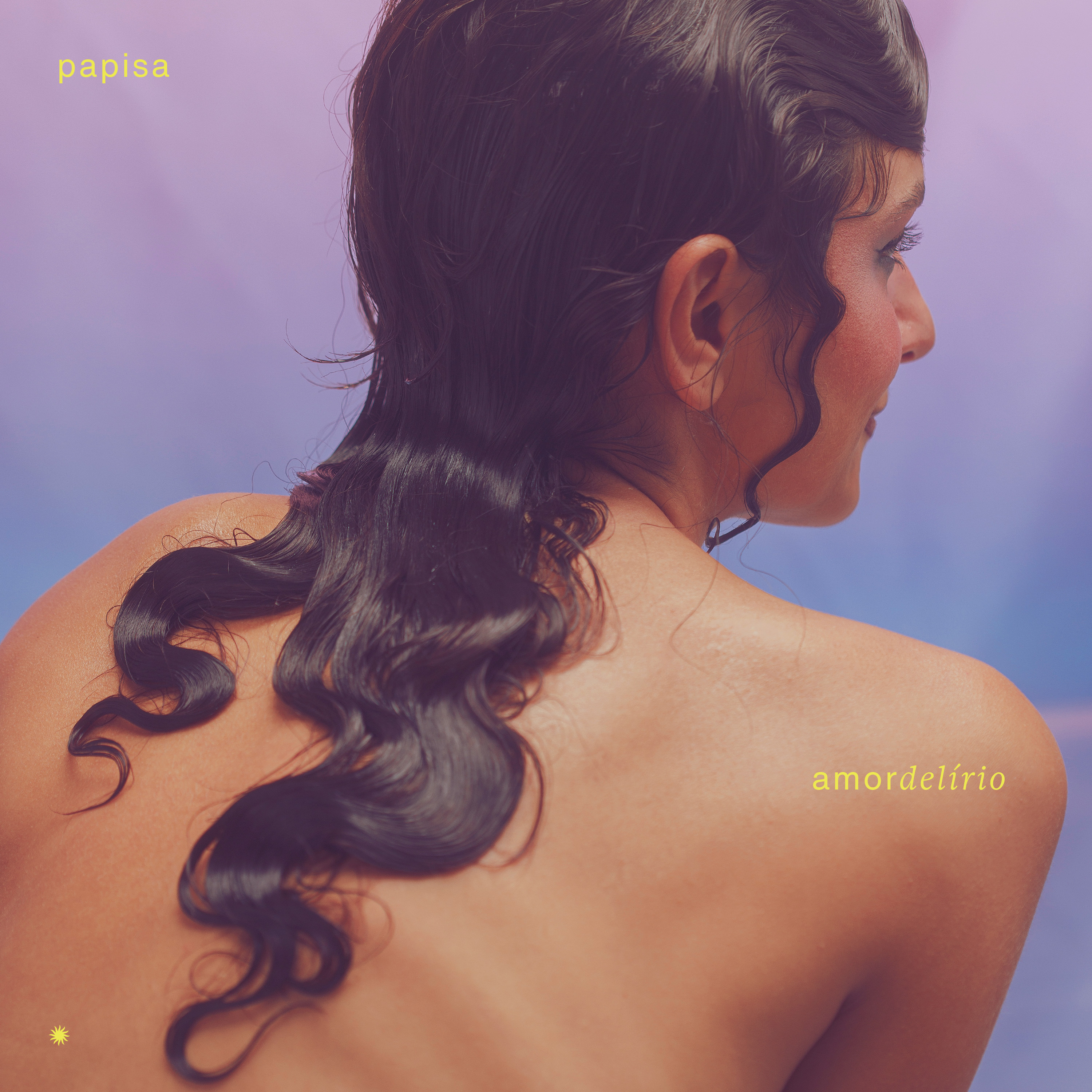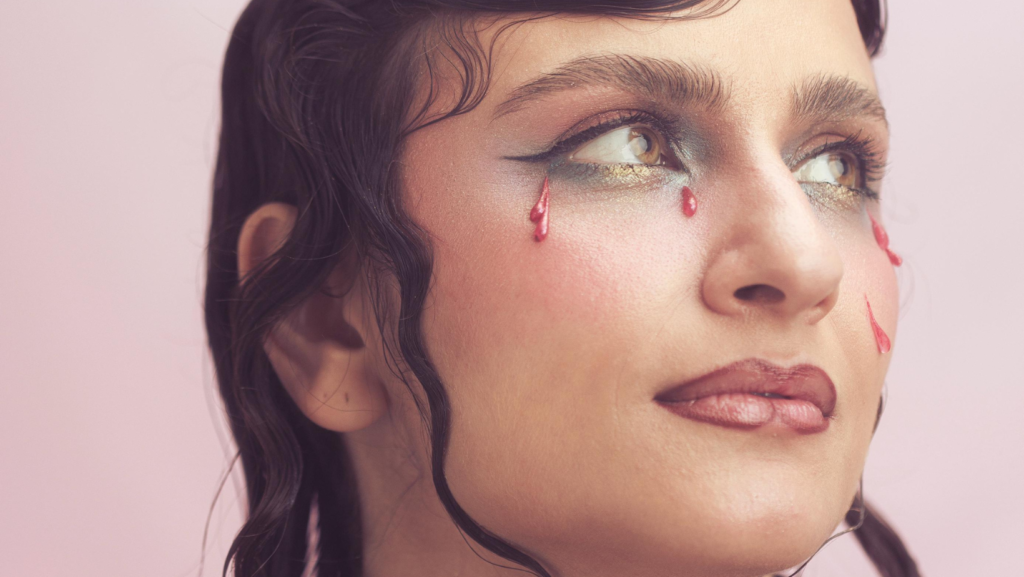After releasing tracks such as ‘Melhor Assim’ and ‘Dores no Varal’, the composer and multi-instrumentalist PAPISA presents her second studio album, ‘Amor Delírio’. The album, released on April 12th, marks a new phase in the artist’s career, bringing a more sentimental tone compared to her previous works. The production is signed by Felipe Puperi, and the album will be released by the Spanish label Costa Futuro, which features artists such as Los Siberianos (Argentina), Queralt Lahoz (Spain), and El Culto Casero (Paraguay).
‘Amor Delirio’ presents a more emotional perspective, exploring themes such as seduction, desire, and the ups and downs of romantic relationships. This change in approach reflects an evolution in PAPISA’s career, whose sound is described as dream -indie-pop with psychedelic influences. The recordings took place during a two-week immersion in São Francisco Xavier, with contributions from other musicians and an experienced production team. The album was also mastered by Brian Lucey , known for working with the likes of The Black Keys, Lizzo and Cage the Elephant.
Rita Oliva, the artist behind the PAPISA project, has extensive musical experience, having been part of bands such as Cabana Café and Parati before pursuing a solo career. She has performed at national festivals such as Bananada (GO), Picnik (DF), and Path (SP), as well as international festivals such as SXSW (Austin, USA) and New Colossus Festival (New York, USA). The new album is an invitation to a journey through the world of feelings, exploring the depths of emotions and the dynamism of relationships.
The new album “Amor Delírio” marks a thematic change in relation to his previous works. What was it like for you to explore the theme of love in your compositions?
Talking about love is not entirely new to me. Although my first solo album was about death and impermanence, emotional life has always inspired my compositions in previous works (before launching myself as Papisa). I like to use curiosity as fuel in creation, and when I thought about making a new album, I think I was trying to somehow make peace with romantic love lol. But I had a question that I consider important, in relation to the weight of social conventions, the commonplace that induces us to seek something idealized, which leads to so many illusions and disillusionments. In the end, the album ended up taking on a very personal and intimate feel, based on experiences (mine or other people’s). I feel like it portrays dynamics that are common for those who are in relationships or are trying to be in relationships.
You mention that the album addresses various phases of romantic relationships, from seduction to disappointment. How do you translate these different emotions into your music?
Normally the beginnings carry an excitement, a tone of adventure, and I feel that this appears in the more energetic form of some arrangements, with more evident drums, bass and guitars, expansive beats, upwards. But there is also the melancholy and mystery that love awakens, and musically they appear in melodies and harmonies in a minor key, arrangements with electric piano, synthesizer and ambiences that create the sensation of a wider space. The lyrics describe affective experiences and a narrative predominantly in the second person, as if they were a conversation. Thinking about the instrumental track, Vento, I wanted to leave a moment of breathing and imagination, necessary both for falling in love and for healing disappointments.
“Amor Delírio” is his second studio album. How do you see the evolution of your music from your first album to this latest work?
My first album was made completely by hand and alone, recorded and produced by me at home. I arranged the entire album and ventured into sound engineering, something I had never done before on my own. It reflects the introspective moment I was experiencing, and was the result of the maturation of some songs that had been played for a long time in shows. In Amor Delírio, the process was very different. All the songs were created especially for the album, selected from several others I composed, and took shape with the help of several creative minds. I called Felipe Puperi to produce and all the bases were arranged, produced and recorded in an immersion in the mountains with a team we chose. The production gained a different body because of this, and the tracks are mostly songs, moving away from the mantric characteristic of the other album.

The album was produced during a two-week immersion in São Francisco Xavier. How did this environment influence the creation of the songs?
I wanted a more solar and less introspective album than the previous one, and this season we spent working intensely on the songs contributed a lot to that. We were among friends, in a place surrounded by nature, and this lightness added to the intense exchange and interaction we were experiencing there ended up somehow being reflected in the songs and arrangements.
You’ve been described as a “kind of psychedelic Cat Power.” How would you describe your sound and what musical influences do you bring to your work?
My sound is close to indie rock and dream pop, with some elements of psychedelia. I’ve listened to a lot of Brazilian music my whole life, Caetano, Chico, Gal, Tom Jobim, Clube da Esquina, Secos e Molhados, and I really like the Portuguese language for composing, for its sound, rhythm and melodic possibilities, so if you think about songs, In some way, all these artists influenced me, especially the work created in the 70s and 80s, which I listened to from a very early age. I can also mention Joni Mitchell and Carole King, two composers that I have always admired, as well as Stereolab, PJ Harvey, Air, Suzanne Vega, Radiohead for their sound.
In addition to your musical career, you are an astrologer and even developed an oracle to complement your previous album, “Fenda”. Are there elements of astrology in “Amor Delirio” too?
Not directly. I can identify patterns in music and especially in my creative process, because I see Astrology as a symbolic language that helps to unravel human behavior, translate life cycles and process experiences over time. I mention the sun and moon in the lyrics, which are strong symbols for me and important astrological elements, but they appear in a more universal context and not related to this specific language.
You have a rich history of performing at international festivals and shows. How have these experiences influenced your music over time?
I believe that the environment and the way music is presented has an impact on artists’ choices, even when it happens unconsciously. David Byrne talks about this in the book “How Music Works” and I find this vision very interesting. This time, in Amor Delírio, I wanted to do something that would lift people’s spirits, that would rock people with sound pressure without losing the immersive and ethereal instrumentation that I like to use. The show is the most direct way to feel people’s response, and playing outside Brazil to an audience that doesn’t necessarily understand the language, but connects directly through the music, brings a rich perception in this sense. Performing at festivals also brings the opportunity to attend other artists’ shows, including in Brazil, which is quite large, which expands my references and inspires me a lot.
What were the biggest challenges you faced during the process of creating and recording “Amor Delírio”?
When I started writing the songs I wasn’t exactly at a very good point in life. The pandemic and isolation were still recent and I wasn’t super inspired to write. That was challenging because I knew I needed a record to work on and yet the compositions weren’t there. I ended up sitting down to do this in a very systematic way, I set myself some deadlines and that helped me get to the album. In production, as I set out to do with a team, I also had to adapt to other people’s times and availability, and this ended up extending the process in a way that is not very common for me. It was a job that required a lot of dedication and patience until it was completed.
You mentioned that you started to question yourself about romantic love when writing this album. What were some of the main reflections that emerged during this process?
The main reflection was: does romantic love actually exist or is it a social convention? Today I see that I was a little disbelieved in meaningful encounters. I think it’s rare and special when two people meet, like each other and want to be together at the same time, with the same intensity, in the same way. We live in a time of hyperconnection , with quick and easy communication and a system that praises individualism, which contributes to the superficiality of relationships. Perhaps this is why more and more people yearn for real connections and find it difficult to deepen relationships. But this is not necessarily a deterrent. The immediacy made us forget that deeper bonds take time to happen. I believe in love when there is interest, availability and a clear choice. It is continuous work, more than a momentary euphoria, and it can be magical and transformative.
How do you hope listeners connect with the songs on “Amor Delírio”? Is there a specific message you would like to convey through this album?
I wanted to exalt the healing capacity of Love and relationships – healthy ones, of course. And convey the message that love exists and is an antidote to loneliness, to broken hearts, especially when we find this love within ourselves before seeking it from someone else. I don’t know if the album translates all of this, but it’s something I like to think about.
Follow PAPISA on Instagram


